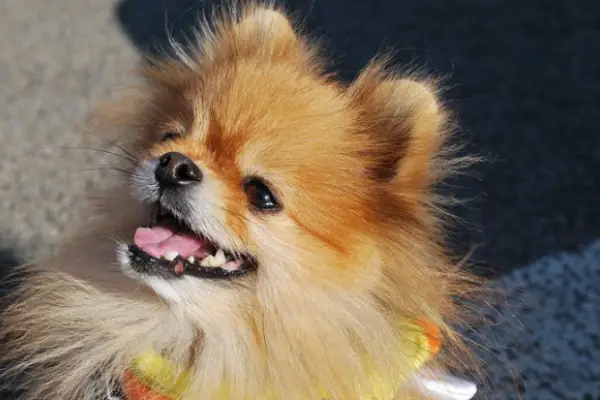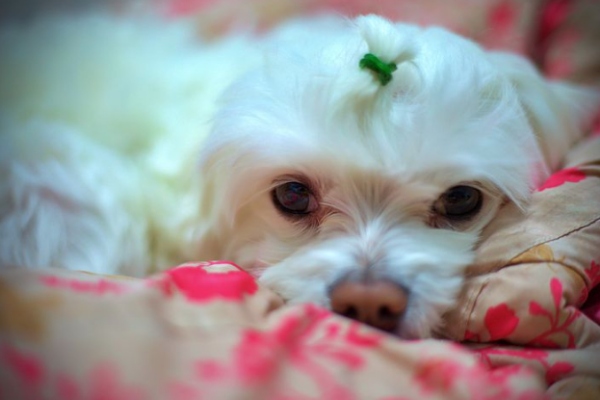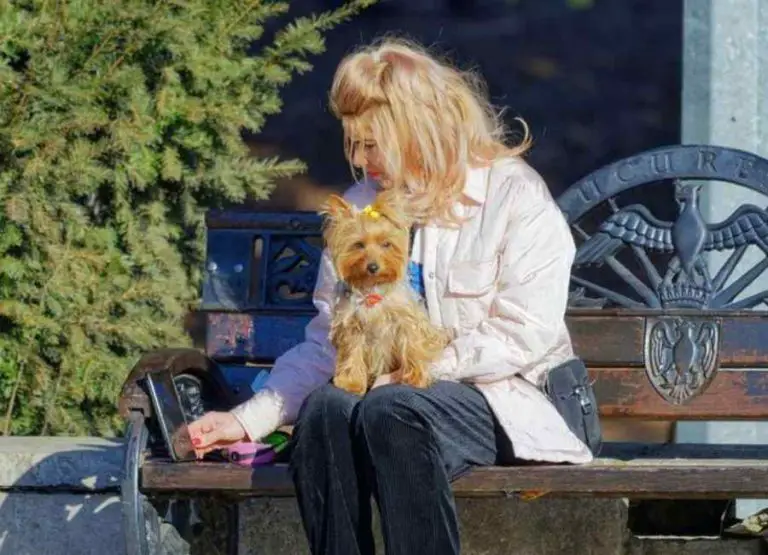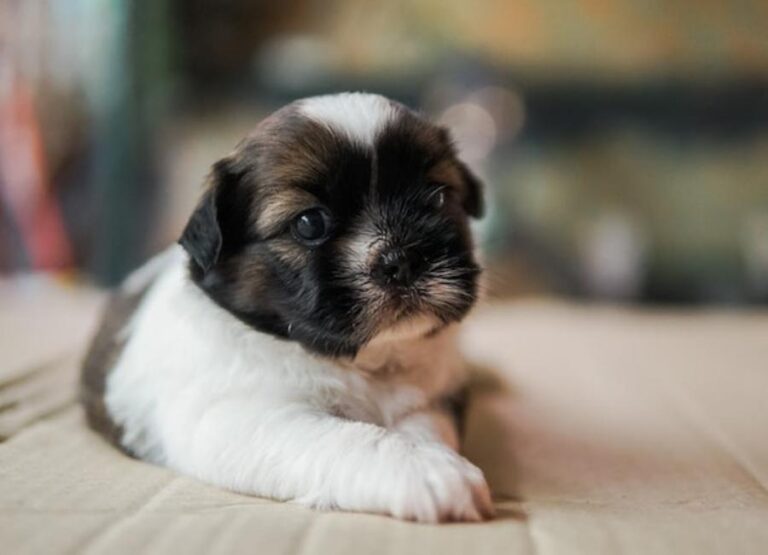Do Pomeranian Shed: 10 Shedding Triggers & Control Tips

Every dog shed, but what matters is the level of shedding, so do Pomeranians shed? Let’s find out together.
Since you can’t totally eliminate shedding in Pomeranians, we’ll outline and explore several typical strategies to reduce it in this post.
We’ll also take a look at some of the most prevalent causes of excessive shedding in Pomeranians.
Let me quickly answer your question, do Pomeranian shed then we continue to discuss other things.
Do Pomeranian shed
Pomeranians shed their hair on a regular basis, however, their shedding rate is very low when compared to other dog breeds. Pomeranians appear to shed more than other dogs due to their thick, long coats which may be visible during grooming.
Their hair is frequently hanging in their long coat because they shed less, giving the impression that they do not shed.
Pomeranians have a low shedding rate throughout the year. There’s a strong chance you won’t notice much hair on the floor until their hairs ultimately grow out.
What causes shedding in Pomeranians
Here are some common causes of excessive shedding in Pomeranians you should know and look out for:
1. Poor nutrition
If a Pomeranian’s diet isn’t balanced, he or she will lose a lot of hair. Poor nutrition has the same impact on Pomeranians as it does on humans.
In Pomeranians, a nutritional imbalance can result in noticeable hair loss. As a result, be cautious about what you feed your dog.
If you detect any unusually heavy shedding after changing your puppy’s diet, switch back or consult a veterinarian, whether it’s winter or spring.
A good dog diet has the nutrients and vitamins required to maintain healthy skin, strong hair follicles, and minimal discharges.
Omega-3 fatty acids have been proved to help Pomeranian dogs develop healthy hair, so including them in their diet is always a good idea.
Because dry skin or dehydration can cause undesirable hair loss in Pomeranians, a moist diet is essential in their lives.
2. Response to allergic reactions
Allergies to certain foods or substances in the environment might cause a Pomeranian’s skin to become irritated and shed.
Your Pomeranian may scratch, lick, or bite himself as a result of the allergy, causing significant hair loss.
Food, dust, medicine, and insect stings, among other things, can cause allergies in Pomeranians.
When a Pomeranian comes into contact with something they are allergic to, their hair falls out as a consequence of an allergic reaction on their skin.
This is a rare sort of shedding, and you’ll only notice it once in a while.
If you discover any allergy triggers, keep them out of your Pomeranian’s reach.
Pomeranians may shed in response to shampoo changes, so if you need to alter shampoos, talk to your veterinarian first.
If you’re concerned about your Pomeranian’s excessive shedding due to allergies, schedule an appointment with your veterinarian.
3. Time of the year
Because the rate or degree of shedding is most usually influenced by seasonality, one of the main causes of Pomeranian’s shedding is the season.
There will be a lot more Pomeranian hair droppings in the spring than there were in the winter.
As a result, it’s plausible to believe that Pomeranian shedding is influenced by the season.
Pomeranians lose hair throughout the summer to strengthen their winter coats, then shed their winter coats in the spring to escape the heat.
In the spring, keep your Pomeranian’s temperature down since warm weather encourages them to sweat less.
You’ll be amazed at how much your Pomeranian sheds if you don’t look after them throughout the summer.
4. Hormonal fluctuations
Hypothyroidism is a hormonal disease that can cause considerable hair loss in dogs.
It affects Pomeranian thyroid glands, creating a thyroxine deficit, which is a hormone that controls metabolism.
Hair loss, a dull and thin coat, discolored skin spots, weariness, a lack of interest for exercise, and weight gain are all symptoms of this illness.
If your female Pomeranian hasn’t been spayed, the amount of fur she sheds at any given moment may be affected by her heat cycles.
At the conclusion of those periods, you could notice her shedding more hair.
All of these causes of hair loss are referred to as hair loss induced by hormone changes. Intensive hair loss can also be a sign of dying Pomeranian.
5. Infestation of parasites
Pomeranians can be attacked by parasites such as fleas, mites, and lice, but they shed a lot as a result of the onslaught.
A single bite from one of these insects can result in a variety of problems, including shedding.
Pomeranians loathe bug bites, and this bite may result in shedding, despite the small amount of shedding.
If your Pomeranian has a parasite, she will continue to shed it until the parasite is eradicated.
As a result, the dog will become irritated and scratch, sometimes leading to bald patches.
Flea bites can cause a number of health issues, including excessive or infrequent shedding.
Flea bites in your Pomeranian can trigger serious allergic responses, so keep him away from them.
6. Excessive Stress
Because all dogs do shed, even Pomeranians, lose their hair when they are frightened or agitated, they shed a lot.
When the Pomeranian is overworked, annoyed, or worried, hormonal swings occur, leading to excessive or low secretions.
Your dog will start flinging fur more frequently when things become frantic for the same reason.
As a result, worry, melancholy, and other negative emotions are frequently associated with stress-related dog hair loss.
Remember that Pomeranians are a little breed designed to be human companions, thus they can’t withstand a lot of stress.
7. Age
Pomeranian puppies are known to go through a puppy stage between the ages of five and seven months, during which they lose their babies.
However, because older Pomeranians are bigger and have a larger surface area of hair, you might argue that they shed more hair.
Pomeranians over the age of eight are more likely to experience health problems, which can lead to hair loss.
Pomeranian pups shed a lot more once they’ve outgrown their puppy coat, which happens around four months. They will then shed copiously until they reach adulthood.
8. Sharp rise in body temperature
Pomeranians have a lot of hair, especially if they live in a warmer climate. Excessive shedding happens when a Pomeranian’s body temperature rises over average.
As a result, avoid overworking your Pomeranian; a daily stroll of 15 minutes should be enough. You’ll have hairs all over your house if you overwork them.
Keep an eye on their temperature and stay away from anything that might cause it to rise. A nice example is playing with your Pomeranian in the heat of the day.
Because of their size, a rise in body temperature may create breathing problems, leading to unnecessary shedding.
9. Changing Pomeranian food
This sort of shedding is common in Pomeranians whose owners want to experiment with different meals rather than sticking to tried-and-true recipes.
A change in your Pomeranian’s diet may cause hair loss and shedding. If your Pomeranian’s food is lacking in nutrients, this is more likely to happen.
Return to the previous food if your Pomeranian’s coat changes after you alter their diet.
When you move to any new dog food that is deficient in certain nutrients, your Pomeranian may shed more to make up for the deficiency or surplus nutrients.
Before altering your dog’s diet, always consult your veterinarian.
10. Infections
Bacterial diseases, fungal infections, and infestation are all significant causes of hair loss in Pomeranians.
These health problems typically cause a lot of pain and contribute to hormonal imbalances, which lead to hair loss.
Bacterial infections such as salmonella can be caught by the consumption of raw foods such as raw chicken.
A fungal infection, which may happen if your Pom comes into touch with mold or other types of fungi, can potentially trigger the problem.
Mold can grow on snacks and dry foods, so store them properly after each use.
Keep in mind that Pomeranians are very curious and will sniff out whatever they can find in the crevices of your home.
As a result, make sure your home and the locations where your Pomeranian hangs out are mold-free.
When Pomeranians inhale spores on the ground during a walk, they may shed excessively.
Common ways to control shedding in Pomeranians
Here are some common ways to control or prevent excessive shedding in Pomeranians which includes:
1. Prevent any form of parasite infestations
Fleas, ticks, and other parasites irritate your Pomeranian’s skin and coat, lowering its quality.
If flea bites are not treated consistently and effectively, they can cause significant hair loss as well as itchy, irritated skin in Pomeranians.
To discuss tick and flea prevention, make an appointment with your veterinarian.
2. Avoid any form of allergies
Itchy ears, chewing at your Pomeranian’s skin often, tears welling up in your Pomeranian’s eyes, and recurrent licking of the paw or skin are all indicators of an allergic response.
Eliminating allergies is one of the most critical things you can do to protect your Pomeranian from shedding excessively.
To name a few allergens, pollen, mold spores, dust mites, and dead skin cells can trigger allergic responses in Pomeranians.
Keep a watch on your dog’s skin or hair for rashes or hair loss that might suggest a food allergy.
3. Give your Pomeranian a bath once in a while
When it comes to shedding control, Pomeranians benefit from frequent bathing and the use of de-shedding dog shampoo.
Bathe your Pomeranian once a month to prevent shedding and maintain their coat clean.
Also, don’t be frightened if you’re removing a lot of stray hair in the bath.
Pomeranians shed a lot at bath time, but this isn’t an issue.
Before bringing them back into the house, make sure they’re totally dry with a towel or a blow-dryer, and be careful around their closed eyes.
4. Avoid all forms of stress
Reduce shedding by managing your Pomeranian’s stress level.
Your dog may shed more than normal as a result of stress.
Many changes in your dog’s environment, such as a move, the death of another pet, or the birth of a new pet, can create anxiety.
Give your dog plenty of exercise, love, affection, and attention to help her cope with stress and shed.
5. Always keep your Pomeranian hydrated
To avoid dry skin and to improve your Pomeranian’s body temperature, make sure your Chihuahua has access to clean drinking water at all times.
This is critical because dogs with insufficient water intake have dry skin and hair, which contributes to excessive shedding.
The chance of hazardous bacteria being swallowed is reduced if your dog’s water dish is kept clean and full.
Make sure your dog is only drinking freshwater by inspecting their water bowls.
Dehydration can cause shedding and other health problems in tiny dogs like Pomeranians.
As a result, make sure your dog gets fresh water at all times.
6. Weekly brushing sessions
The most effective way to cure Pomeranian hair loss is using a brush. It not only enhances blood flow to the skin’s surface but also helps natural fats disperse.
It also prevents stray bristle hairs from falling to the floor or onto the sofa from the brush.
Because Pomeranians adore prizes, always provide them before and after brushing.
Brushing your Pomeranian for at least 7-10 minutes is suggested on average.
Brush your Pomeranian at least twice every six days, depending on your schedule; however, if you’re busy, you may brush once a week.
When considering why Pomeranians shed, weekly brushing should be considered a prophylactic measure.
The long-haired Pomeranian will need a pin brush or a slicker brush to groom his long hair in and out of season. Pomeranian pups require extra care due to their small stature.
7. Regular medical checkup
Because shedding can be caused by a variety of health issues, this is an important first step in figuring out how to keep your Pomeranian from shedding.
Always get advice from your veterinarian and have your Pomeranian examined on a regular basis.
8. Give your Pomeranian a high-quality food and supplements
Keep a close eye on what your Pom eats. A well-balanced diet promotes healthy skin and reduces shedding in all dogs.
A Pomeranian’s diet should be well-balanced and nutritious. The condition of your dog’s coat is influenced by how well you feed him.
Feeding your Pom a well-balanced food can keep even the tiniest hair loss on the inside to a minimum.
Your Pom’s hair and skin will be as smooth and healthy as possible if she eats dog food high in Omega-3 fatty acids, oils, and minerals.
Natural fatty acids like omega-3 and omega-3 fatty acids, which are particularly helpful to Pomeranians and help keep their skin and coat in good form, are commonly found in dietary supplements.
If your Pom has skin problems, he or she will scratch and itch a lot, causing hair to fall out of the follicles in greater numbers.
To reduce shedding and irritation, give your Pom a decent vitamin and Omega-3 supplement.
Supplements containing these substances are good for your Pom health as well as hair removal.
In addition to skin and coat benefits, fish oil helps to keep joints and bones healthy.
Before making any modifications to your Pomeranian’s food, speak with your veterinarian.
With this information, I strongly hope your question do Pomeranian shed was addressed!

![Do Boston Terriers Smell [Reasons They Might Smell] Do Boston Terriers Smell](https://petcreeks.com/wp-content/uploads/2022/11/Do-Boston-Terriers-Smell-768x555.jpg)

![Can Boston Terriers Be Left Alone [Helpful Tips] Can Boston Terriers Be Left Alone](https://petcreeks.com/wp-content/uploads/2022/11/Can-Boston-Terriers-Be-Left-Alone-768x555.jpg)


